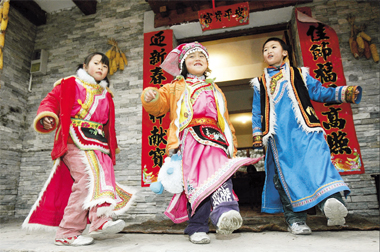Rossa Zhang's hands trembled as she held her camera and stood reverently in front of the collapsed Yingxiu Primary School, reduced to rubble in the devastating earthquake that hit Sichuan Province last May.
"It is only when you see it for yourself that you can feel the tremendous grief," says the 28-year-old documentary film maker. "The buildings are distorted terribly, the ground is cracked and the walls are still tilted. I cannot help but think of the young lives that disappeared in seconds underneath."
About 220 pupils were buried out of the total 473, with 20 teachers dead among the total 47.
Zhang, together with a team of Shanghai artists, photographers and scriptwriters, ventured to the Qiang ethnic group area in the mountainous region in Sichuan during the past Spring Festival. Yingxiu is about 90 kilometers west from Chengdu, the provincial capital, and it was one of the most severely damaged areas.
|

|
|
The Qiang minority, with a population of about 300,000 in China, is known as "the group in the clouds" because they live high in the cloudy and mist-shrouded mountains. They are good at singing, dancing and hunting. For centuries they have lived quietly and kept to themselves. [Shanghai Daily] |
They were on a four-day tour to collect folk arts, hoping to better preserve the Qiang culture after the 8.0-magnitude earthquake on May 12. It also struck regions of Qinghai and Gansu provinces.
Though it has been three months since Zhang returned from that half-hidden valley, the memory is still vivid.
"I just can't forget the smiling faces of warm-hearted Qiang people, the beautiful Min River that has fed them for centuries and the ugly scars left by the quake along the road," Zhang recalls.
Along their bumpy road through mountains and valleys, broken highways, fallen houses and crumbled construction projects were common sights.
It took them one day and two nights to reach isolated Qugu Village in Maoxian County.
The team reached the village on the fifth day of the Chinese Lunar New Year to join the Qiang people's Eju festival, one of their most important annual celebrations. It commemorates a great hunter.
This year's Eju festival was the first time all the Qiang people in the area gathered after the earthquake.
"We were deeply moved to see them holding each others' hands, solemnly vowing to rebuild their damaged homes and to be brave and optimistic," Zhang says.
The Qiang minority is known as "the group in the clouds" because they live high in the cloudy and mist-shrouded mountains. For centuries they have lived quietly and kept to themselves.
Almost all the houses in the Qiang-populated valleys in Maoxian County were badly damaged in the quake. And it's reported about 30,000 Qiang people died in the quake.
"It's urgent to save the group's arts and culture, like the gorgeous folk costumes and beautiful local songs," Zhang says.
The Eju festival is more than 1,000 years old. On that day, the men go hunting while the women, dressed in colorful costumes and embroidered shoes, prepare a feast at home.
When the men return from the hunt, bringing back their game, the women embrace them and serve them wine.
The men demonstrate their skills, such as shooting and wrestling. The women dance and sing.
These days, however, there are fewer animals in the forests, so the traditional hunt has become a target competition; the targets are steamed buns made by the women.
The festival honors the great hunter Hongmuji, who after many years realized that killing with his spear, bow and arrow deprived the animal with a spirit of its right to life. In guilt he retreated to a cave to confess his wrongs, until his death.
The festival also thanks the omnipotent god Abasi who provides the animals that have fed the Qiang people for ages.
It also thanks Mother Nature and reminds the people of the importance of living in harmony with nature.
"It was quite an experience to see more than 1,000 Qiang people, all dressed up, gathering at 100 large tables loaded with huge bowls of pork, beef and goat meat," Zhang says. "You can even smell the happiness in the air, which had been lost since last May."
At the feast, Zhang met Chen Guoyong, a 20-year-old Qiang man who works as an apprentice in a Korean restaurant in Chengdu. He told her that all Qiang people were summoned to attend the festival. Some were working in big cities, some worked in nearby tourism spots.
Chen said he begged for a week's leave from his boss so he could cook for his fellow. He felt that cooking was the only thing he could do for the village.
After the earthquake, many Qiang people working outside returned to their backward valley to help with reconstruction.
"It is so touching to see these people give up their jobs and come back for their needy hometown," Zhang says. "Maybe there is little we can do to help them, but I do believe that little by little, great things can be done."
(Shanghai Daily May 5, 2009)